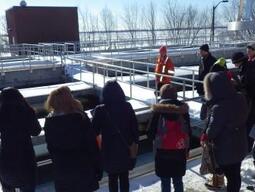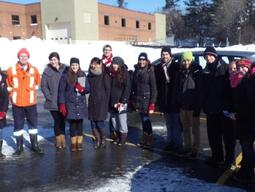Welcome to the Biol 510 webpage for Winter 2013
This ecology course will examine the underlying causes of global change issues at levels ranging from biogeochemical processes through to human behaviour. The aim of the course is to develop students' perspectives on the relationship between ecology and the sustainability of our current civilisation. Students will lead informal seminar discussions on some component of this theme that is of particular interest to them.
Initial sessions will provide an overview of the history of human impacts on the structure and functioning of the Earth's ecosystems, especially in the context of the global phosphorus cycle. The principal question that this course will address is: What are the implications of anthropogenic phosphorus use for our civilisation’s sustainability?
This course is for final year undergraduates and is specifically aimed at enhancing their capacities for critical thinking, group discussion, and independent learning. By the end of the course, students should be able to apply fundamental ecological perspectives toward understanding the Earth’s ecosystems and how they are being affected by human activities.
Learning outcomes:
By the end of this course, the student should be able to:
- Demonstrate an understanding of major global change issues related to human phosphorus use that integrates ecological, economic and social perspectives
- Explain the biogeochemical contexts and processes of human phosphorus use that make it a global change issue
- Develop, present and write cohesive, original syntheses on a chosen global change issue related to human phosphorus use
- Describe the history of human influences on the global phosphorus cycle
- Discuss the role of ecology in influencing and predicting the future of our civilisation
Professor: Paul Grogan
Seminar times: Tuesdays 10.00; Thursdays 08.30
Location: Room 3112, Biosciences building
Calendar: Sessions are 1.5 hours
Assessment:
15% Active participation in discussions (questions, comments, suggestions)
10% Seminar written questions
35% Seminar presentation (on book chapter, or a paper from reference list or one selected by the student if agreed with me)
40% Paper
| Week beginning | Day and time | Convenor | Topic | Reading |
|---|---|---|---|---|
| 7th January | Tuesday 10.00 |
Paul Grogan
|
Introduction | |
| Thursday 08.30 |
Paul
|
What can biology tell us about our future? | ||
| 14th January | Tuesday 10.00 | Paul | David Suzuki film: The Force of Nature (part 1) |
Natural gas heating footprint (discussion) |
| Thursday 08.30 | Paul | David Suzuki film: The Force of Nature (part 2) | Film discussion | |
| 21st January | Tuesday 10.00 | Paul | Phosphorus cycle | Smil, V. 2000. Phosphorus in the Environment: Natural flows and Human Interferences |
| Thursday 08.30 |
No class - Thinking time |
|||
| 28th January | Tuesday 10.00 | Informal class - Opportunity for one-on-one discussions | ||
| Thursday 08.30 | Informal class - Opportunity for one-on-one discussions | |||
| 4th February | Tuesday 10.00 | Iv Garcha |
How will issues of food security caused by anthropogenic P use further exacerbate the health and economic inequities between rich and poor nations? |
Childers D. L. et al, 2011. Sustainability Challenges of Phosphorus and Food: Solutions from Closing the Human Phosphorus Cycle. Bioscience (61)2:117-124 |
| Thursday 08.30 | Brendan Groves |
What are the perceived benefits of chemical, biological or a combination of those treatments to recover phosphorus from wastewater? |
||
| Saturday morning 9.30-12.30 | Field trip to Ravensview Sewage Treatment Plant | |||
| 11th February | Tuesday 10.00 | Sara Hudson |
Why has life evolved to rely on phosphorus, a relatively rare element, and how can this knowledge inform our present-day practices? |
Westheimer, F.H., 1987. Why Nature Chose Phosphates. Science (235):1173-1178. |
| Thursday 08.30 | Adrian Dingle |
What can an analysis of an individual’s ecological footprint for phosphorus tell us about the optimal ways to manage anthropogenic P use? |
Stout, W., et al, 1999. Reducing phosphorus export from croplands with FBC flyash and FBG gypsum. Fuel 78:175-178 | |
| 18th February | Tuesday 10.00 | READING WEEK | ||
| Thursday 08.30 | READING WEEK | |||
| 25th February | Tuesday 10.00 | Yoon-Mi Bae |
What are the benefits and consequences of strategies and technologies that are most likely to maximize P recovery? |
Schroder J, Cordell D, Smit AL, J and Rosemarin A, 2010. Sustainable strategie for improving phosphorus use management (Chapter 4 in Sustainable Use of Phosphorus. EU report ENVB1/ETU/2009/0025). Plant Research International, Wageningen University. |
| Thursday 08.30 | Rebekah Brown |
How does our choice of clothing materials change our use of P and why, when people think of reducing their “P footprint” does this not come to mind as an option? |
Blaise, D et al, 2004. Effect of Organic and Modern Method of Cotton Cultivation on Soil Nutrient Status. Communications in Plant and Soil Science 35(9,10):1247-1261. |
|
| 4th March | Tuesday 10.00 | Victoria Attridge |
What are the processes and constraints involved for society to address the effects of P-induced eutrophication on Canadian freshwater ecosystem services? |
Costanza, R. et al 1997. The value of the world's ecosystem services and natural capital. Nature (387):253-260. Lake Erie eutrophication case study information |
| Thursday 08.30 | Daniel Mayer |
What are the most important economic consequences of phosphorus-caused eutrophication, and how can an understanding of ecosystem resilience help create incentives or provide solutions to this problem? |
Carpenter, S. R. and Cottingham, K.L. 1997. Resilience and restoration of lakes. Conservation Ecology 1(1):1-14. |
|
| 11th March | Tuesday 10.00 | Donovan Capes |
How have evolutionary selection pressures on humans in the past rendered us ill-equipped as a society to deal with the approaching phosphorus limitations, and what social policies can help address this impending crisis? |
Rees, W. 2002-03. Is Humanity Fatally Successful? Journal of Business Administration and Policy Analysis (30-31): 67-100. |
| Thursday 08.30 | Ronnie Lau |
Do our current approaches to governing and policy-making make it difficult to create global change agendas such as those that might be required to attack the phosphorus problem? |
Raustiala, K. 1997. States, NGOs, and International Environmental Institutions. International Studies Quarterly 41:719-740. | |
| 18th March | Tuesday 10.00 | Ariadna Neguletu- Morogan |
What are the health trade-offs of using animal/human manure as compared to industrially manufactured synthetic fertilizer for meeting crop phosphorus requirements? |
Eamens, G.J. et al. 2006. Survival of pathogenic and indicator bacteria in biosolids applied to agricultural land. Australian Journal of Soil Research, 44:647–659. |
| Thursday 08.30 | Rachel Wang |
How does human nutrition, the economy, and sustainability of anthropogenic P use issues affect dietary preferences in developed countries? |
Reijinders, L., and Soret, S. 2003. Quantification of the environmental impact of different dietary protein choices. American Journal of Nutrition, 78(suppl.):664S-668S. | |
| 25th March | Tuesday 10.00 | Camille Di Lulio |
How is the problem of anthropogenic P use in part driven by a consumerist ethos lacking in ecological conscience, and how might we address this? |
Hamilton, C. 2010. Consumerism, self-creation and prospects for a new ecological consciousness. Journal of Cleaner Production 18:571-575. |
| Thursday 08.30 | Susan Lee |
Should declining phosphorus reserves be a major concern in medicine, and if so how should the healthcare system prepare for phosphorus shortage in the future? |
Kreisberg, J. 2008. Green Medicine: An Integral Approach that benefits Physicians, Patients, Communities and the Environment. Integrative Medicine 6(6):38-42 |
|
| 1st April | Tuesday 10.00 |
Debate I: Initiatives in Canada to implement human crop production using P from treated sewage should avoid drawing attention to aesthetic concerns Debate II: The word ‘organic’ as a label for promoting more environmentally-conscious anthropogenic P use should be replaced |
||
| Thursday 08.30 |
|
Debate III: The primary focus of our civilisation’s efforts to achieve sustainable P use should be the development of a legally-binding global protocol Synthesis(Paul) |
Last Updated: 8 May 2013
Class field trip to Kingston's Ravensview wastewater sewage treatment plant guided by Stephen King (February 9th)











